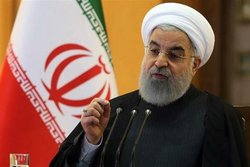 Iranian President Hassan Rouhani said on Wednesday that several world leaders have told him that their countries are suffering from Washington’s unfair use of dollar against them, adding that gradually the world will find a way to dump US dollar in international transactions.
Iranian President Hassan Rouhani said on Wednesday that several world leaders have told him that their countries are suffering from Washington’s unfair use of dollar against them, adding that gradually the world will find a way to dump US dollar in international transactions. RNA - Speaking at a cabinet meeting this morning, President Rouhani referred to his meetings with world leaders that took place on the sidelines of the Kuala Lumpur Summit 2019 last week and said, “In a four-way forum, participated by Iran, Malaysia, Turkey and Qatar, we realized that other countries are also experiencing difficulties in their interactions with the US.”
The leader of one of the participating states, President Rouhani recounted, talked about the weapons his country had purchased from the US and the problems they were now facing in procuring spare parts, because the Americans were demanding several times the actual price of those weapons for maintenance services.
The Iranian chief executive also noted that there was consensus among several participants in the Kuala Lumpur Summit on the need for ditching the dollar.
“Cryptocurrency and exchanges of national currencies and gold were among the issues raised at the summit, and the four aforementioned countries agreed to find ways” to promote those mechanisms, Rouhani said.
The problems currently facing the Iranian nation are more or less similar to those the other states are grappling with, he pointed out, stressing that all countries, including those that took part in the Kuala Lumpur Summit, blame the US for the pressure campaign on the Iranian nation.
“Nobody has doubts about the fact that the Islamic Republic of Iran has completely fulfilled its commitments and taken steps within the framework of regional and global peace, stability and security,” Rouhani said, adding that “It is the opposite side that has violated its obligations.”
He was referring to Tehran’s commitments under a nuclear deal it signed in 2015 with the P5+1 group of states — comprising the United States, the UK, France, Russia, and China plus Germany.
In May 2018, the US unilaterally withdrew from the deal that had been endorsed by the UN Security Council Resolution 2231.
Since then, the administration of President Donald Trump has unleashed the “toughest ever” sanctions against Tehran, notably targeting its key oil exports.
Washington’s JCPOA exit and subsequent re-imposition of sanctions against Tehran have left the future of the historic agreement in limbo.
Elsewhere in his remarks, Rouhani expressed Iran’s readiness to hold talks with the P5+1 countries if they show their resolve to fulfill their commitments and attempt to make up for their past mistakes.
Both Iran and Japan, he emphasized, have put forth proposals in that regard.
In September, Governor of the Central Bank of Iran (CBI) Abdolnasser Hemmati said that many countries in the world are establishing trade relations based on local currencies thanks to the US unilateral sanctions against some counties, adding that Iran is following suit to circumvent SWIFT limitations.
Speaking on the sidelines of a cabinet meeting, Hemmati said that the US’ sanctions regime has helped remove dollar from trade transactions between various countries.
According to Fars News Agency, he added that Tehran is making efforts to further strengthen trade transactions via national currencies, and render SWIFT – the Society for Worldwide Interbank Financial Telecommunication – practically useless.
“Our recent talks with officials from Turkey and Russia centered around ditching dollar and bypassing SWIFT in our trade transactions,” he said.
“Accordingly, we are moving toward using alternative payment systems and conducting our business through national currencies,” he added.
Noting that at the moment, a major part of Iran’s transactions with Russia, Turkey and Iraq is done via the use of national currencies, the CBI governor said “we made a proposal to the Russian side for using an alternative payment system with the Eurasian Economic Union (EAEU) member states now that Iran is a member, too, and the Russian president welcomed the proposal.”
“New conditions will be formed in the banking transactions of regional countries,” Hemmati promised.
SWIFT suspended access for several Iranian-based banks in November in the wake of US sanctions against the Islamic Republic.
847/940